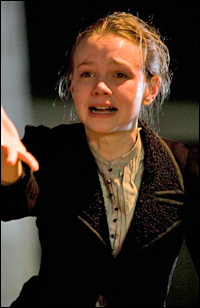
*
Instant love affairs were ignited in the audience when Carey Mulligan first rushed onto the Broadway stage in 2008, thanks to an impossibly romantic entrance Anton Chekhov concocted for his lovely, luminous, ill-fated Nina in The Seagull.
Nina's lover, Konstantin, sensing her approach, is waxing eloquent about her to his uncle — "I can't live without her. Even the sound of her footsteps is beautiful. I'm out of my mind with happiness" — and then, startlingly, there she is: a snow flurry of girlish exuberance and starry-eyed innocence, light and white and radiantly real.
At the time, it seemed like the breathlessly brave arrival of a star, but, truth to tell, Mulligan had already laid groundwork for her breakthrough, playing Nina in London and landing her first film lead — a teen coming of age in the '60s in "An Education."
Some critics thought they'd just stumbled across another Audrey Hepburn. The performance earned her Oscar consideration, won her nods from BAFTA, the National Board of Review and the Independent Spirit Awards, among others, and got her big-time Hollywood attention: "Wall Street: Money Never Sleeps" opposite Shia LaBeouf, "Drive" opposite Ryan Gosling and "Shame" opposite Michael Fassbender. Next, she'll be Daisy Buchanan to Leonardo DiCaprio's "Great Gatsby" and Tobey Maguire's Nick Carraway in a remake that Baz Luhrmann will direct Down Under. Because rehearsals don't begin until August, Mulligan saw a chance to bolt back to the New York stage — and went for it, arriving May 13 for the first preview of the Atlantic Theater Company production of Through a Glass Darkly, Jenny Worton's stage adaptation of the same-named Ingmar Bergman movie that got the Oscar as 1961's Best Foreign Language Film. (Off-Broadway's Atlantic is presenting the play at New York Theatre Workshop's home on East 4th Street while ATC's West 20th Street mainstage is under renovation.)
As holidays go, this one is pretty harrowing and heavy-duty. Her character, Karin, has just been sprung from an asylum and sent vacationing with the three men who more or less put her there in the first place — her scholarly, neglectful dad (Chris Sarandon), her empathetic doctor husband (Jason Butler Harner) and her younger bro (Ben Rosenfield). Wild mood swings keep everybody tapping as fast as they can.
"The play takes 90 minutes to tell the story, and there are only two points in the play where I leave the stage," Mulligan notes. "In the play version, we come on it full-speed, and it just keeps going. David Leveaux, the director, describes Karin as being so down she has a scream right at the bottom of her throat — that's how we find her.
 |
||
| Mulligan in Seagull. |
||
| photo by Johan Persson |
"When I'm playing Karin, I'm not focusing on her illness but on what she wants and how it comes out in her makeup. She wants to be loved, she wants her family to be happy, she wants people to be kind to each other. It's a play about someone struggling with the fact the world isn't always kind and people aren't always good."
The money may be better in the movies, but Mulligan is still — intrinsically — a creature of theatre. "In London," she recalls, "I'd always struggled with the line in Act Two when Trigorin leaves, Nina turns, looks at the sky and says, 'I'm dreaming.'"
The line never landed in London and always landed in New York, she says. The difference? The theatre. She had actually been in it before as a 14-year-old visitor and remembered "sitting in the back row and thinking, 'If I could ever do a play here, that would be it. That would be all I would ever, ever, ever want.'" Then, The Great Day came, and "I remember going up to the dressing room for the first time, and there were light bulbs around the mirror. Then, going downstairs, and there was a fire escape outside. These, literally, were my childhood dreams. Everything that happened with 'An Education' and then the award season and stuff was sorta pale in comparison to how I felt about being on Broadway. That was the dream."
That dream was reinforced nightly as she geared up for her classic entrance. In costume, with earphones blasting away at an energizing power-ballad, she tore all over the theatre — down to the costume room under the stage, back up and out and all the way up the fire escape to a ladder that went into the sky where she looked about, usually nodded to an old man who lived in the adjacent building, then descended down the ladder and fire escape, through the flies and on stage in time.
"I can't tell you how many nights I did that, running all over and then on stage. I felt like I'd been on a horse, running and cantering around the lake. It was a ritual, and as I walked across the fire escape, I always thought a shadow was passing over. I don't know what it was, but I felt that I'd been blessed by something or someone."










